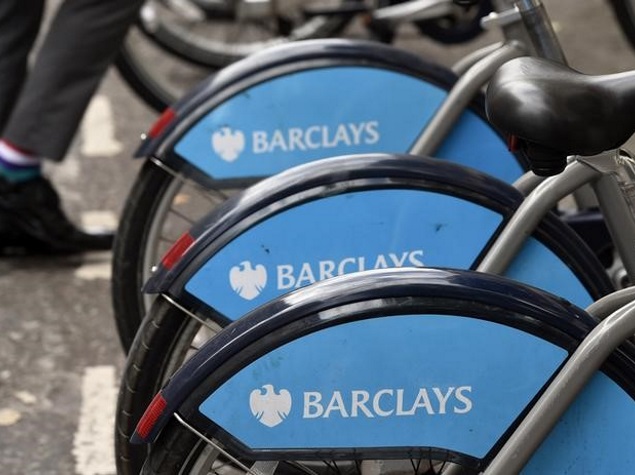- Home
- Internet
- Internet News
- Barclays Taps Vein Biometrics in Bank Fraud Fight
Barclays Taps Vein Biometrics in Bank Fraud Fight

The British bank said it has teamed up with Japanese technology firm Hitachi to develop a biometric reader that scans a finger and identifies unique vein patterns to access accounts, instead of using a password or PIN.
Vein recognition technology is used by some banks in Japan and elsewhere at ATM machines, but Barclays said it is the first bank globally to use it for significant account transactions.
Barclays said it is the start of a ramp up in its use of biometrics to provide safer verification systems that cut fraud risks from customers sharing or choosing obvious passwords, or forgetting PINs.
"Biometrics is the way to go in the future. We have no doubt about that, we are committed to it," said Ashok Vaswani, chief executive of Barclays personal and corporate banking.
Vaswani said Barclays was improving technology and security, but criminals were also getting more sophisticated.
"You can't let these guys create a breach in the dam. You've got to constantly stay ahead of the game," he told Reuters.
Britain's private companies lost 21 billion pounds ($34.5 billion) from fraud in 2012 and financial firms suffered 5.4 billion pounds of that, according to National Fraud Authority estimates.
Sophisticated hackers
Banks are coming under particular scrutiny amid evidence of increasing attacks from sophisticated hackers.
Wall Street bank JP Morgan last month said it was working with U.S. law enforcement authorities to investigate a possible cyber attack, after the FBI said it was looking into reports on a spate of attacks on U.S. banks.
Royal Bank of Scotland and other UK banks have suffered serious attacks by hackers in the last two years and are trying to strengthen their defences from coordinated attacks and other more routine fraud.
Barclays said its vein authentication technology will be rolled out to corporate customers next year and it expects strong take-up from its 30,000 large corporate clients.
The finger scanner, which looks like a mini Star Wars Stormtrooper helmet, sits on the customer's desk and plugs into a computer. The vein pattern is matched with one stored on a SIM card, so Barclays does not hold a record. The scanned finger has to be attached to a live human body to work.
The bank launched voice recognition biometrics for private banking clients last year and Vaswani said rolling that out more widely to retail clients "will definitely happen in 2015" and the bank was exploring other opportunities.
That could include using similar technology on mobile tablets, which is the fastest growing area for European banks, or at ATMs.
© Thomson Reuters 2014
For the latest tech news and reviews, follow Gadgets 360 on X, Facebook, WhatsApp, Threads and Google News. For the latest videos on gadgets and tech, subscribe to our YouTube channel. If you want to know everything about top influencers, follow our in-house Who'sThat360 on Instagram and YouTube.
Related Stories
- Samsung Galaxy Unpacked 2025
- ChatGPT
- Redmi Note 14 Pro+
- iPhone 16
- Apple Vision Pro
- Oneplus 12
- OnePlus Nord CE 3 Lite 5G
- iPhone 13
- Xiaomi 14 Pro
- Oppo Find N3
- Tecno Spark Go (2023)
- Realme V30
- Best Phones Under 25000
- Samsung Galaxy S24 Series
- Cryptocurrency
- iQoo 12
- Samsung Galaxy S24 Ultra
- Giottus
- Samsung Galaxy Z Flip 5
- Apple 'Scary Fast'
- Housefull 5
- GoPro Hero 12 Black Review
- Invincible Season 2
- JioGlass
- HD Ready TV
- Laptop Under 50000
- Smartwatch Under 10000
- Latest Mobile Phones
- Compare Phones
- Moto G15 Power
- Moto G15
- Realme 14x 5G
- Poco M7 Pro 5G
- Poco C75 5G
- Vivo Y300 (China)
- HMD Arc
- Lava Blaze Duo 5G
- Asus Zenbook S 14
- MacBook Pro 16-inch (M4 Max, 2024)
- Honor Pad V9
- Tecno Megapad 11
- Redmi Watch 5
- Huawei Watch Ultimate Design
- Sony 65 Inches Ultra HD (4K) LED Smart TV (KD-65X74L)
- TCL 55 Inches Ultra HD (4K) LED Smart TV (55C61B)
- Sony PlayStation 5 Pro
- Sony PlayStation 5 Slim Digital Edition
- Blue Star 1.5 Ton 3 Star Inverter Split AC (IC318DNUHC)
- Blue Star 1.5 Ton 3 Star Inverter Split AC (IA318VKU)

















